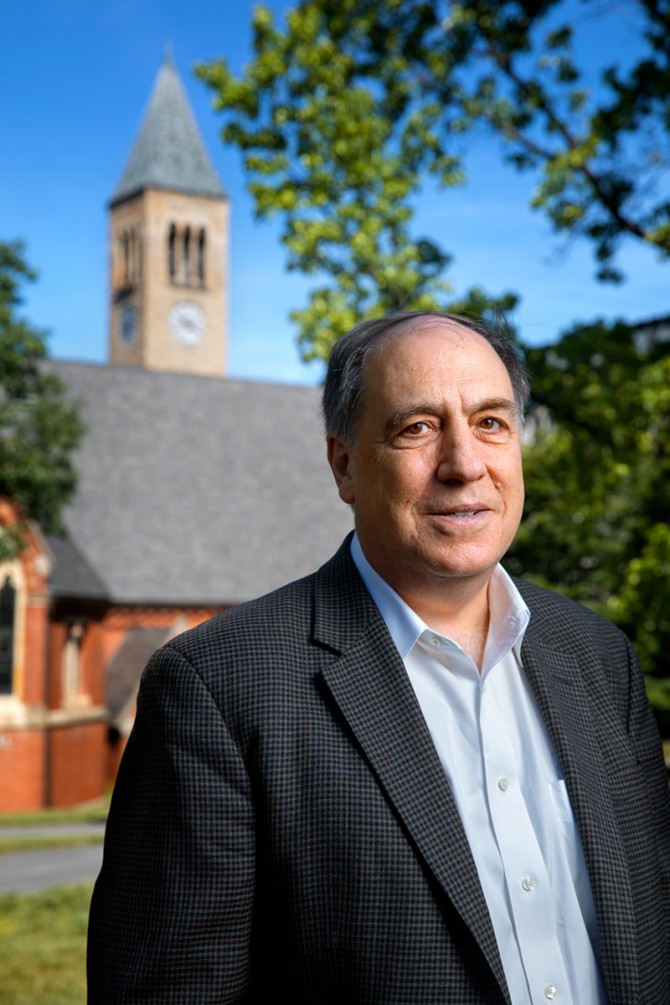Academic Integration Initiative builds on first-year successes
By Joe Wilensky
A year into Cornell’s Academic Integration Initiative, Gary Koretzky ’78 is relocating to Ithaca and taking on a new title – vice provost for academic integration, effective July 1 – to continue leading the university’s efforts to better promote, build and enhance collaborative research efforts across its campuses.
A rheumatologist and immunologist, Koretzky will retain his position as professor in the Department of Medicine at Weill Cornell Medicine, and also will have an adjunct appointment in Ithaca in the Department of Microbiology and Immunology at the College of Veterinary Medicine.
In May 2017 Cornell Provost Michael Kotlikoff and Provost for Medical Affairs Dr. Augustine M.K. Choi, the Stephen and Suzanne Weiss Dean of Weill Cornell Medicine, launched the academic integration effort, and Koretzky, former dean of the Weill Cornell Medicine Graduate School of Medical Sciences, was named vice dean, focused on academic integration.
The initiative has been successful and garnered strong interest in its first year, Koretzky said, and has given collaborating faculty and researchers plenty to build on.
Initial surveys of faculty on both campuses had shown that interest in greater and long-term collaborations was high, but that barriers to those efforts included a lack of awareness of potential partnerships, difficulty in arranging travel for all participants and a lack of seed funds to launch collaborations.
In its first year, the initiative set up four scientific symposiums; provided support for trainees and investigators to travel and work between campuses to bridge laboratories with common projects; and offered peer-reviewed, seed grant support to help coalesce several dual-campus research programs.
The first symposium, on gene expression and RNA regulation of health and disease, was held in Ithaca last fall. Symposiums on antimicrobial resistance and health equities were held in New York City in March, and another is being held this week (June 26-27) on immunology in Ithaca; more are planned for the fall. Participation has been robust, with each attended by 70-140 faculty, staff and trainees, who interact one-on-one.
The symposiums have not only introduced participants to collaborative research opportunities, but also have better familiarized them with work their own colleagues are doing across departments, Koretzky said, and tangible changes have come out of each of the four completed symposia.
“There are indications that people are working together in a different way,” he said. “The proof will actually be when they begin to develop scholarship, begin to make discoveries, those discoveries are turned into programs, and those programs get supported. But that’s a multiyear process.”
The initiative also seeks to spur long-term collaborations that will pursue additional grants to support research groups, ultimately aiming for National Institutes of Health Center of Excellence or equivalent status for programs in areas that reflect the areas and directions of the faculty.
“There are opportunities – in cancer, for example – to develop programs that are truly world-class,” Koretzky said. “There are programs in many areas of biology where the fundamental strengths in Ithaca marry nicely with the translational strengths in New York City.”
Koretzky sees opportunities for new programs and collaborative opportunities in biomedical engineering, for example. The Ithaca campus has the Nancy E. and Peter C. Meinig School of Biomedical Engineering, where faculty are pursuing research that could benefit from collaboration with Weill Cornell Medicine. He also wants to pursue new ways for Weill Cornell Medicine faculty to engage with social scientists and complementary data scientists in Ithaca.
He also hopes the initiative will continue to build strength as a recruitment tool for hiring faculty, and he islooking forward to integrating his efforts with some of the broader work being done by the President’s Visioning Committee on Cornell in New York City.
For Koretzky, the move to Ithaca was welcome for both professional and personal reasons. He is a 1978 graduate of the College of Arts and Sciences, and he and his wife, Kim Overby, really like the area. Overby, an M.D. and bioethicist, also has a Cornell appointment: professor of practice in the Department of Science and Technology Studies. Their daughter, Maya, is a 2013 Cornell graduate.
“I know Weill Cornell Medicine quite well; the relocation will give me an opportunity to learn about the depth and breadth of research here in Ithaca,” Koretzky said. “I believe we are on an excellent trajectory and am excited to work with colleagues on both campuses to maintain this momentum.”
Media Contact
Get Cornell news delivered right to your inbox.
Subscribe

